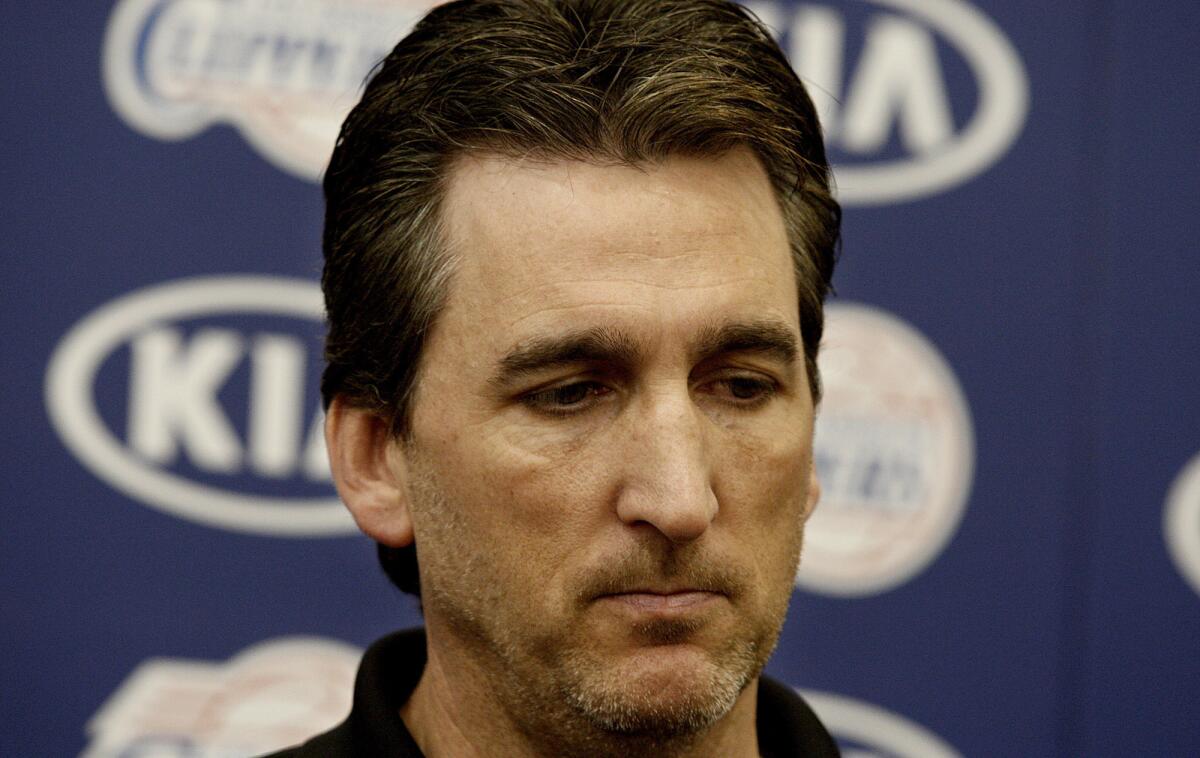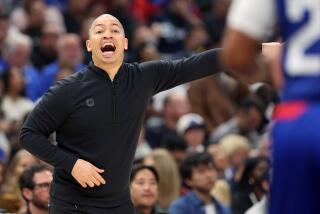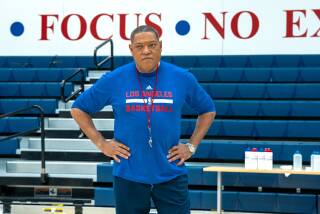Vinny Del Negro’s exit is Exhibit A in an NBA problem

The firing of Vinny Del Negro remains troublesome. The obvious involvement of Chris Paul remains perplexing.
Both are class people, the kind with whom you’d enjoy sharing dinner and talking about books and family. Both worked hard for an entire season and, collectively, fell short of their goal. The Clippers’ first-round loss to Memphis in the NBA playoffs didn’t cut it for either.
But clearly the player had all the leverage over the coach. Clippers owner Donald Sterling did everything but confirm that scenario when he told The Times’ T.J. Simers that “you have to keep the players happy.”
Say all you want about Sterling — and many people have for many years — but his responses to those questions were refreshingly lacking in the usual public relations spin and drivel. The prevailing theory for years is that Sterling didn’t know what was going on. Suddenly, he’s the one telling it like it is.
And it is, in the NBA, a league where the inmates run the asylum. There has seldom been a bigger Exhibit A than the firing of Del Negro.
For the last half of the season, as the Clippers ran off to a franchise-record 56-26 mark, swept the Lakers and took the Pacific Division, the internal discussion was about how to keep Paul. Del Negro was an afterthought, a sacrificial lamb, if needed.
Obviously, the Clippers think they needed.
Paul, a point guard supreme in a league that has become point-guard-centric, is a free agent. The Clippers can start negotiating with him July 1. With them, he has the right to sign for as many as five years and as much as $107.3 million. If he goes elsewhere, his maximums are four years and $80 million. That $27.3-million edge should be enough.
But, to Paul’s credit, he wants a title. And if Paul didn’t think Del Negro was the one to take him and his teammates to the NBA’s promised land, then $80 million might have sufficed, might still. One thing is indisputable. If Paul had walked into the Clippers’ front office, any time in the last few months, and even whispered favorable words about Del Negro, there would have been no change.
The likelihood is that Paul didn’t whisper, or speak, at all. More likely, his agent, Leon Rose, took care of things with as little as one sentence, one shrug, one raised eyebrow. The logic is too overwhelming. Do you think the Clippers would have fired Del Negro if they thought that would upset Paul?
Somewhere along the line, somebody up high in the NBA needs to take stock. Every time a player gets a coach fired, player values are disproportionately pumped up. So does the assumption of entitlement. Which is the employee and which is the employer? That becomes unanswerable. The star salesman is as important as the CEO, even though the star salesman has invested no money, taken little risk and made zero strategic decisions.
There are apples and oranges in a comparison of players as star salesmen and coaches as CEOs. But the ongoing excesses of current-day pro sports, especially the NBA, are not an un-burstable bubble.
Is it merely the nature of the NBA, where there are fewer players and, thus, more valued stars? Or has it been the nature of the NBA to nurture that?
Del Negro’s firing was silly, but not even that surprising in the NBA. It was change for the sake of change. There was panic stemming for the same things that panic all team officials these days — restless fans, Internet noise and pundits perseverating on the easy fire-the-coach topic.
Now, the Clippers will look for a mid-40s coaching talent, somebody with about five years in the league and maybe four trips to the playoffs; somebody who was once a good player in the league — especially as a point guard — and maybe even played under the likes of the masterful Gregg Popovich at San Antonio.
Gee, that would be Vinny Del Negro.
Unless it is Phil Jackson or Popovich himself (don’t hold your breath), the newcomer will be in the same spot as Del Negro, only worse. He will take months to get up to speed with new systems and players, and know full well that his fate may rest with a nod or shrug from Chris Paul’s agent.
If he wins the title, everybody will celebrate the great coaching-change decision. One columnist, this one, will see it as a logical next step from the foundation built by Del Negro.
The NBA is a marvel of marketing and branding and getting the public all in a tizzy over its product. TV, all that matters today in sports, dotes on it and it dotes back. The NBA is so busy pursuing its popularity, and the cash flow that it provides, that it hasn’t taken time to create a culture, especially in situations such as the Del Negro firing, of doing the right thing.
Chris Paul is a great player and a good person. The league should have protected him from himself.
More to Read
Go beyond the scoreboard
Get the latest on L.A.'s teams in the daily Sports Report newsletter.
You may occasionally receive promotional content from the Los Angeles Times.











